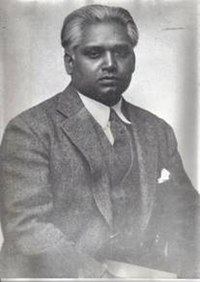Taraknath Das
| Taraknath Das তারকনাথ দাস |
|
|---|---|
 |
|
| Born |
15 June 1884 Kanchrapara, 24 Parganas, Bengal, British India |
| Died | 22 December 1958 (aged 74) New York City |
| Spouse(s) | Mary Keatinge Morse |
Taraknath Das (or Tarak Nath Das) (Bengali: তারকনাথ দাস) (15 June 1884 – 22 December 1958) was an anti-British Bengali Indian revolutionary and internationalist scholar. He was a pioneering immigrant in the west coast of North America and discussed his plans with Tolstoy, while organising the Asian Indian immigrants in favour of the Indian independence movement. He was a professor of political science at Columbia University and a visiting faculty in several other universities.
Tarak was born at Majupara, near Kanchrapara, in the 24 Parganas district of West Bengal. Coming from a lower-middle-class family, his father Kalimohan was a clerk at the Central Telegraph Office in Calcutta. Noticing the flair of this brilliant student with the pen, his headmaster encouraged him to appear in an essay contest on the theme of patriotism. Impressed by the quality of the paper by a school boy of sixteen years, one of the judges, the Barrister P. Mitter, founder of the Anushilan Samiti, asked his associate Satish Chandra Basu to recruit the boy. On passing his Entrance Examination with very high marks, in 1901, Tarak went to Calcutta and got himself admitted to the well-known General Assembly's Institution (now Scottish Church College) for university studies. In his secret patriotic activity, he found full support from his elder sister Girija.
To stir Bengali enthusiasm, commemoration of the achievements of Raja Sitaram Ray, one of the greatest Bengali Hindu heroes, was introduced as a festival, in addition to Shivaji. In the early months of 1906, Bagha Jatin or Jatindra Nath Mukherjee was accompanied by Tarak when the former was invited to preside over the Sitaram Festival at Mohammadpur in Jessore, the ancient capital of Bengal. On this occasion, during a closeted meeting around Jatin were present, in addition to Tarak, Shrish Chandra Sen, Satyendra Sen and Adhar Chandra Laskar: all the four, one after the other, were to leave for higher studies abroad. Nothing was known about the object of this meeting till in 1952 when, during a conversation, Tarak spoke of it. Along with specific higher education, they were to acquire military training and knowledge of explosives. They were especially urged to create a climate of sympathy among people of the free Western countries in favour of India’s decision to win freedom.
...
Wikipedia
